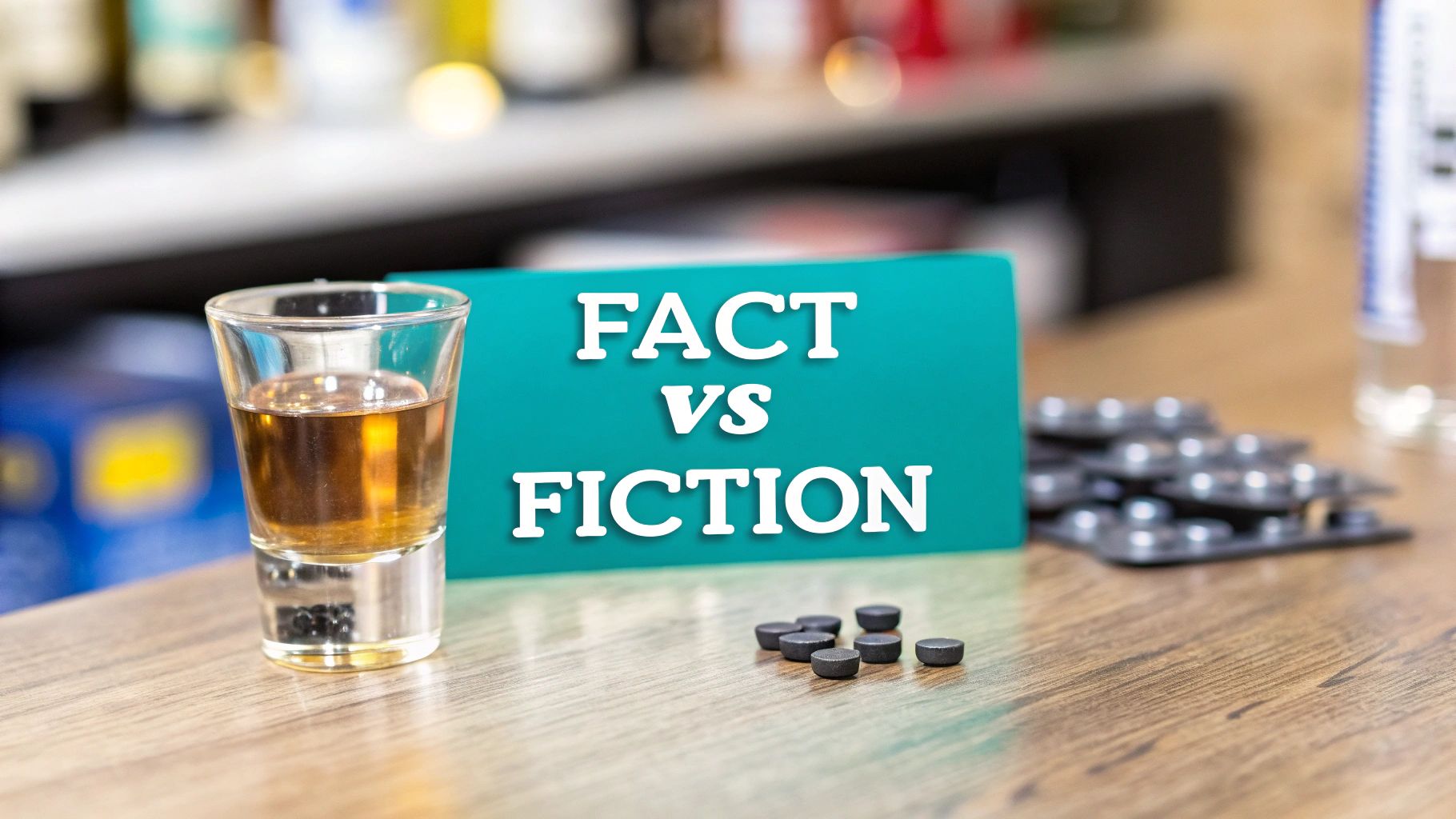

· By Annemarie
Activated Charcoal for Alcohol Fact vs Fiction
We’ve all heard the rumors. Maybe a friend swore by it after a big night out, or you saw it advertised as the ultimate party hack: take some activated charcoal to soak up the alcohol, prevent a hangover, and wake up feeling fresh.
It sounds almost too good to be true. And unfortunately, it is.
When it comes to alcohol, activated charcoal is essentially useless. It won’t stop you from getting drunk, it won’t lower your blood alcohol level, and it’s definitely not a magic eraser for a night of drinking. The science on this is crystal clear.
The Truth About Activated Charcoal and Alcohol
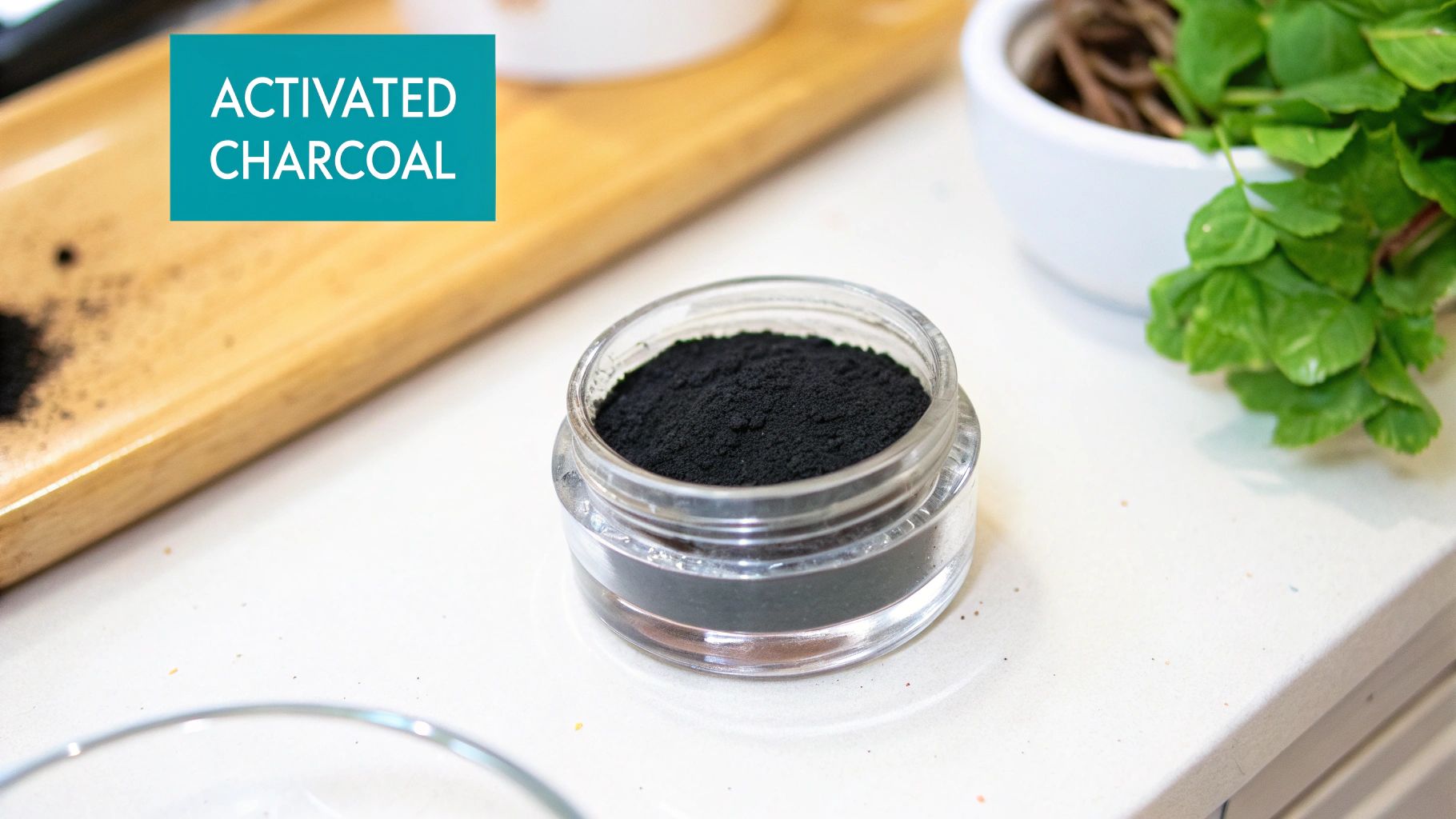
The marketing is clever. Since activated charcoal is a legitimate medical treatment for certain types of overdoses and poisonings, it’s easy to think it would work on alcohol, too. But this is a classic case of taking a real medical tool and completely misusing it.
The problem comes down to two things: timing and chemistry.
Activated charcoal works through a process called adsorption. Think of it like a super-porous sponge with a massive surface area. Certain toxins and chemicals get trapped in its tiny nooks and crannies as it passes through your digestive system.
But alcohol is different. It’s a very small molecule that doesn’t bind well to charcoal. Even more importantly, alcohol is absorbed into your bloodstream almost instantly, long before the charcoal even has a chance to get to it. By the time that charcoal pill is making its way through your stomach, the alcohol is already at the party in your bloodstream.
Debunking a Common Myth
This isn’t just a new theory—it’s a well-established medical fact that’s been known for decades.
For example, a study all the way back in 1986 tested this exact idea. Researchers gave volunteers alcohol and then gave them activated charcoal 30 minutes later. The result? There was no meaningful difference in their blood alcohol levels compared to the group that just drank water. You can read more about the study’s findings on alcohol and charcoal interaction.
The Takeaway: Activated charcoal is simply not the right tool for the job when it comes to alcohol. It’s like trying to catch rain with a fishing net—the target just slips right through.
There's a lot of misinformation out there, so let's break it down and put these myths to rest once and for all.
Myths vs Reality Activated Charcoal and Alcohol Use
This table cuts through the noise, comparing the popular beliefs about activated charcoal and alcohol with the hard scientific facts.
| Common Myth | Scientific Reality |
|---|---|
| "Charcoal soaks up alcohol to prevent hangovers." | Alcohol gets absorbed far too quickly and doesn't bind well to charcoal, making it completely ineffective for preventing a hangover. |
| "Taking charcoal can sober you up faster." | Activated charcoal has no effect on your blood alcohol concentration (BAC). The only thing that can sober you up is time. |
| "It’s a safe, natural way to detox after drinking." | Not only is it ineffective, but misusing charcoal can mess with the absorption of important medications and nutrients. It can also cause some unpleasant side effects, like constipation. |
The bottom line? Save your money and skip the charcoal pills on your next night out. They won't help, and they might even interfere with things your body actually needs.
How the Activated Charcoal Sponge Really Works
To get why activated charcoal is a total dud for alcohol, you first have to understand why it’s a hero for other things. Its secret isn't some complex chemical reaction. It's all physical.
The easiest way to think about it is to picture a microscopic, hyper-porous sponge. But instead of soaking up water, this sponge grabs and holds onto molecules on its surface.
This process is called adsorption. That's not a typo for absorption, where a paper towel soaks up a spill. Adsorption is more like a massive game of static cling; chemicals and toxins literally stick to the outside of the charcoal.
This incredible talent comes from its structure. Activated charcoal is made by heating stuff like wood or coconut shells to blistering temperatures. This process etches out millions of tiny pores, creating an absolutely massive surface area. Get this: a single gram of activated charcoal can have the same surface area as an entire football field.
The Science of Adsorption
This giant, porous surface basically acts like a molecular magnet. When someone takes a specific poison or certain drugs, the charcoal travels through their gut, offering up countless little parking spots for these nasty molecules.
The toxins get physically stuck to the charcoal's surface, trapped in its web of pores. This keeps them from ever getting absorbed into the bloodstream. Once captured, the charcoal and its toxic passengers are harmlessly escorted out of the body.
It’s exactly why emergency rooms keep it on hand for very specific situations. But its success is all about what it’s trying to catch.
Activated charcoal’s power is purely mechanical. It doesn’t neutralize toxins; it simply traps them, preventing your body from absorbing them. Its success is determined by whether a substance can physically "stick" to its surface.
This infographic shows what people think happens when you mix charcoal and alcohol.
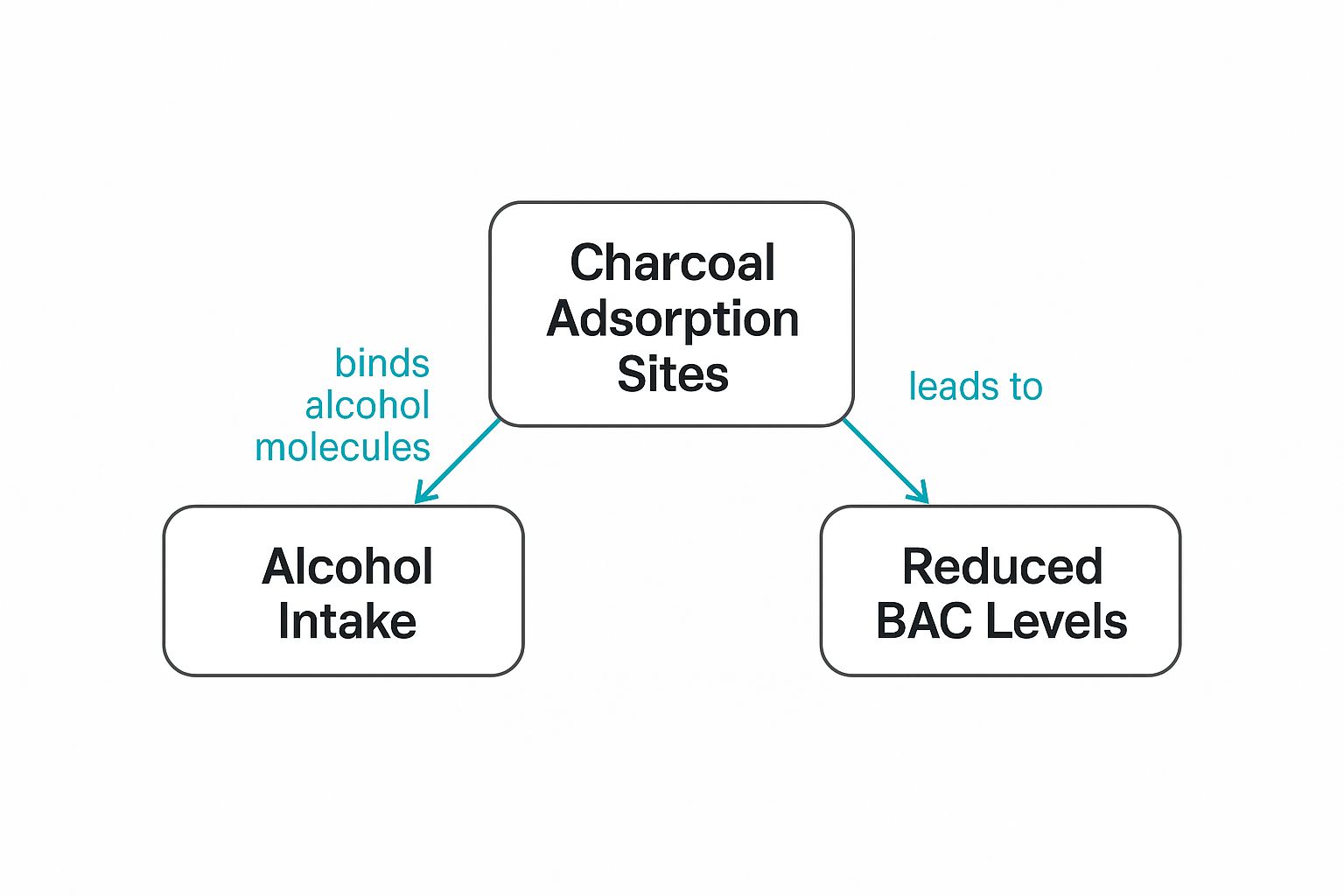
While it looks like a logical process, the reality is that alcohol molecules just don't play along. They refuse to bind to these sites, breaking the entire chain of events before it even starts.
What Makes a Substance Stick
Whether this "molecular velcro" works or not comes down to a few key things. Activated charcoal is at its best when it's grabbing large, complex, organic molecules—think certain prescription drugs or pesticides.
Here's what makes a substance a good candidate for getting trapped:
- Large Molecular Size: Bigger molecules have more surface area to latch onto the charcoal.
- Non-Polar Nature: Charcoal loves to grab things that don't dissolve well in water.
- Slow Absorption Rate: The charcoal needs enough time to catch the substance in the gut before your body absorbs it.
And this is exactly where the problem with using activated charcoal for alcohol pops up. As we're about to see, alcohol’s own properties let it completely sidestep this trapping mechanism.
Why Alcohol Slips Through the Cracks
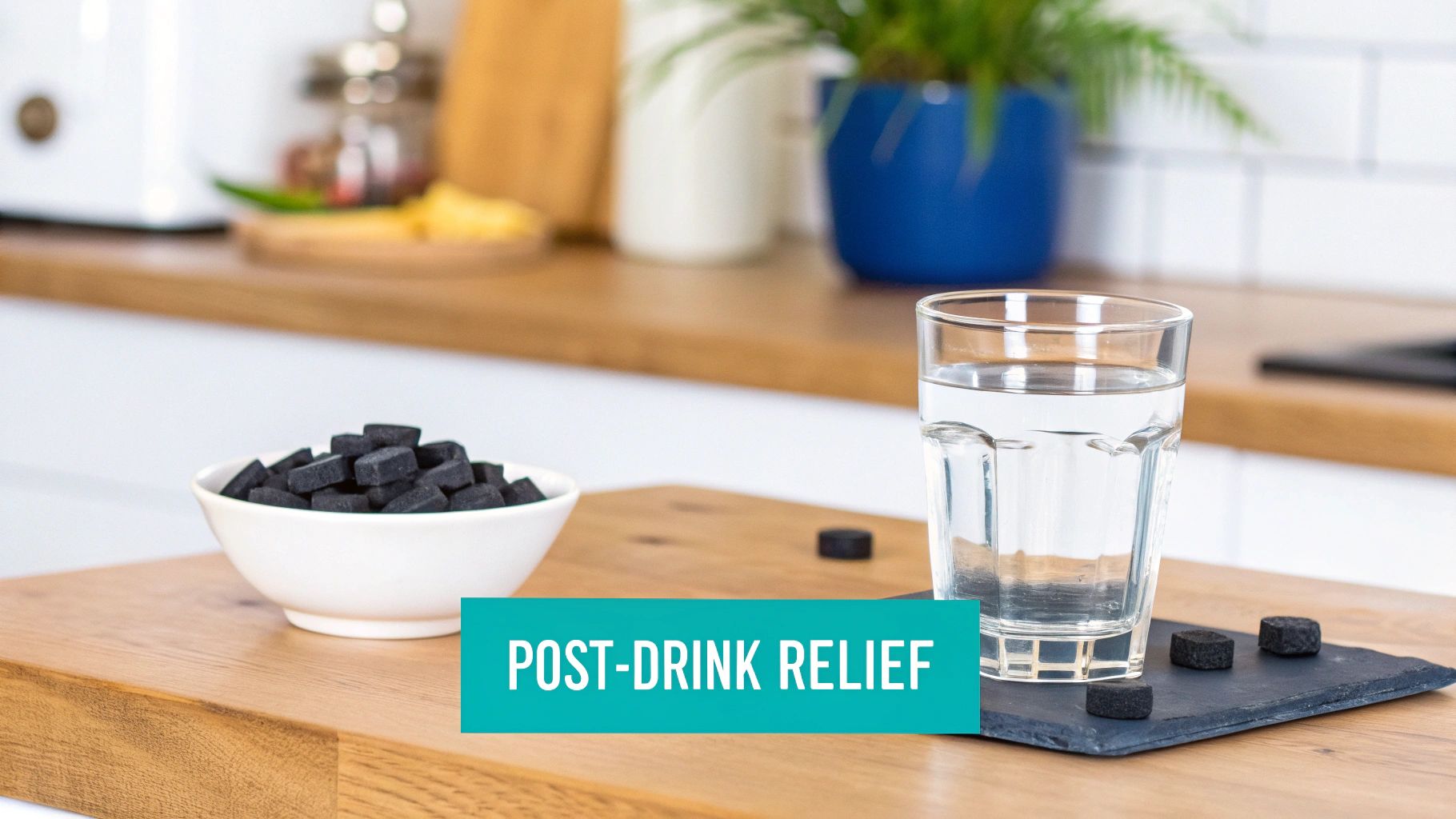
The idea of a charcoal "sponge" soaking up alcohol before it hits you sounds great in theory. But in reality, alcohol is one of the few things that just slips right through the net.
It's like trying to catch mist with a fishing net. The holes are there, but the target is way too fine and fast to get caught. This all comes down to two simple but powerful reasons.
First off, it’s all about speed. Your body absorbs alcohol incredibly fast, starting almost the second it hits your stomach. Unlike other toxins that need to be broken down, alcohol gets a VIP pass straight into your system.
By the time you swallow an activated charcoal capsule, the alcohol from that drink is probably already doing laps in your bloodstream and cranking up your blood alcohol concentration (BAC). The charcoal is basically showing up to a crime scene long after the culprit has fled.
The Race Against Absorption
Think of it as a footrace. Alcohol is a world-class sprinter, dashing from your stomach into your bloodstream in minutes flat. Activated charcoal, on the other hand, is more like a casual walker, slowly making its way through your digestive tract.
For the charcoal to do its job, it has to be in the same place at the same time as the substance it's trying to trap. Alcohol wins this race every single time, so by the time the charcoal arrives in your stomach, the party's over and the guest of honor is long gone.
This lightning-fast absorption is a huge part of what causes hangovers, as those nasty byproducts from alcohol metabolism build up in your system before you know it.
The Chemistry Mismatch
Even if timing wasn't an issue, there's a bigger, more fundamental problem: they just don't have good chemistry. Activated charcoal works through a process called adsorption, which basically means things have to physically stick to its surface. The best candidates for this are large, complex molecules.
Alcohol is none of those things. It's a tiny, simple molecule that has almost no interest in charcoal’s binding sites. It just doesn't "stick" well at all.
Key Insight: Alcohol's small molecular size and rapid absorption rate make it a terrible candidate for adsorption by activated charcoal. It's both too quick to be caught and too slippery to be held.
And this isn't just a hunch; clinical studies have backed this up again and again. Research consistently shows that taking activated charcoal—even right after drinking—does not significantly lower blood alcohol levels. People who take charcoal end up with pretty much the same BAC as those who don't.
The data is crystal clear: using activated charcoal for alcohol just doesn't work, all thanks to these two key principles.
- Rapid Entry: Alcohol gets into the bloodstream almost immediately, leaving no time for the charcoal to intervene in the stomach.
- Weak Binding: The chemical makeup of ethanol (alcohol) means it just won't stick to the charcoal's surface effectively.
So, while that charcoal sponge is a beast at trapping larger, slower-moving toxins, it’s completely outmatched when it goes up against alcohol. The unique way our bodies handle a drink means it will always evade capture, making charcoal a useless tool for preventing intoxication or stopping a hangover in its tracks.
When Activated Charcoal Is a Lifesaver
Let's get one thing straight: while activated charcoal is totally useless for a hangover, in the world of emergency medicine, it's a genuine hero. We're not talking about wellness fads or detox trends here. This is about its critical, life-saving role as a frontline treatment for certain poisonings and drug overdoses.
When a medical pro administers it in a hospital, activated charcoal can literally stop a tragedy in its tracks. It acts like a molecular sponge, grabbing onto harmful substances before the body has a chance to absorb them into the bloodstream.
But here’s the catch—its effectiveness is incredibly specific. It only works on certain substances and has to be given almost immediately after something toxic is swallowed. This is exactly why it's a tool for emergency rooms, not a supplement for your medicine cabinet at home.
A Tool for Specific Emergencies
In a real poisoning or overdose situation, the clock is ticking. Loudly. Activated charcoal is at its most powerful when given within the first hour of swallowing a toxic substance. After that window closes, its ability to help drops off a cliff as the poison or drug starts making its way into the system.
This rapid-response is what makes it so valuable. Medical teams use it to trap substances like:
- Overdoses of certain prescription meds, like some antidepressants or sedatives.
- Ingestion of specific poisons, including certain pesticides or toxins.
- Accidental consumption of harmful chemicals, but only if they have the right molecular structure for charcoal to latch onto.
Deciding to use it is a carefully calculated medical call, not some one-size-fits-all fix. To put it in perspective, data from German poison control centers in 2016 showed that out of nearly 270,000 poisoning cases, activated charcoal was only the right call in 4.37% of them. That number really drives home its role as a targeted, but vital, tool for very specific situations. You can discover more insights about its clinical use here.
Important Takeaway: Activated charcoal is a serious medical treatment reserved for specific, time-sensitive emergencies. It must be administered by healthcare providers who know when—and when not—to use it.
This medical context is the key to understanding why using activated charcoal for alcohol is so completely off the mark. As it turns out, alcohol is on a long list of substances it simply can't touch.
What Charcoal Cannot Help With
Knowing when activated charcoal doesn't work is just as important as knowing when it does. It's completely ineffective against a whole host of common poisons and substances because their chemical properties just won't stick to the charcoal's surface.
This is where the line between medical fact and wellness myth becomes crystal clear. Activated charcoal is a highly specialized tool, not the universal "detox" agent it's often marketed as.
The table below really highlights how specific its applications are.
When Activated Charcoal Is (and Is Not) Medically Recommended
| Effectively Adsorbed by Charcoal | NOT Effectively Adsorbed by Charcoal |
|---|---|
| Certain Antidepressants | Alcohol (Ethanol) |
| Aspirin and Acetaminophen | Heavy Metals (like Iron, Lead, Lithium) |
| Sedatives and Barbiturates | Corrosive Agents (like Bleach or Acids) |
| Some Pesticides and Herbicides | Petroleum Products (like Gasoline) |
| Theophylline (Asthma Medication) | Cyanide |
As you can see, alcohol is sitting firmly on the "nope" list. Its chemical structure and super-fast absorption make it impossible for charcoal to capture. So, reaching for this stuff after a night of drinking isn't just a waste of time—it completely misses the point of its true, life-saving purpose.
The Hidden Dangers of Misusing Charcoal
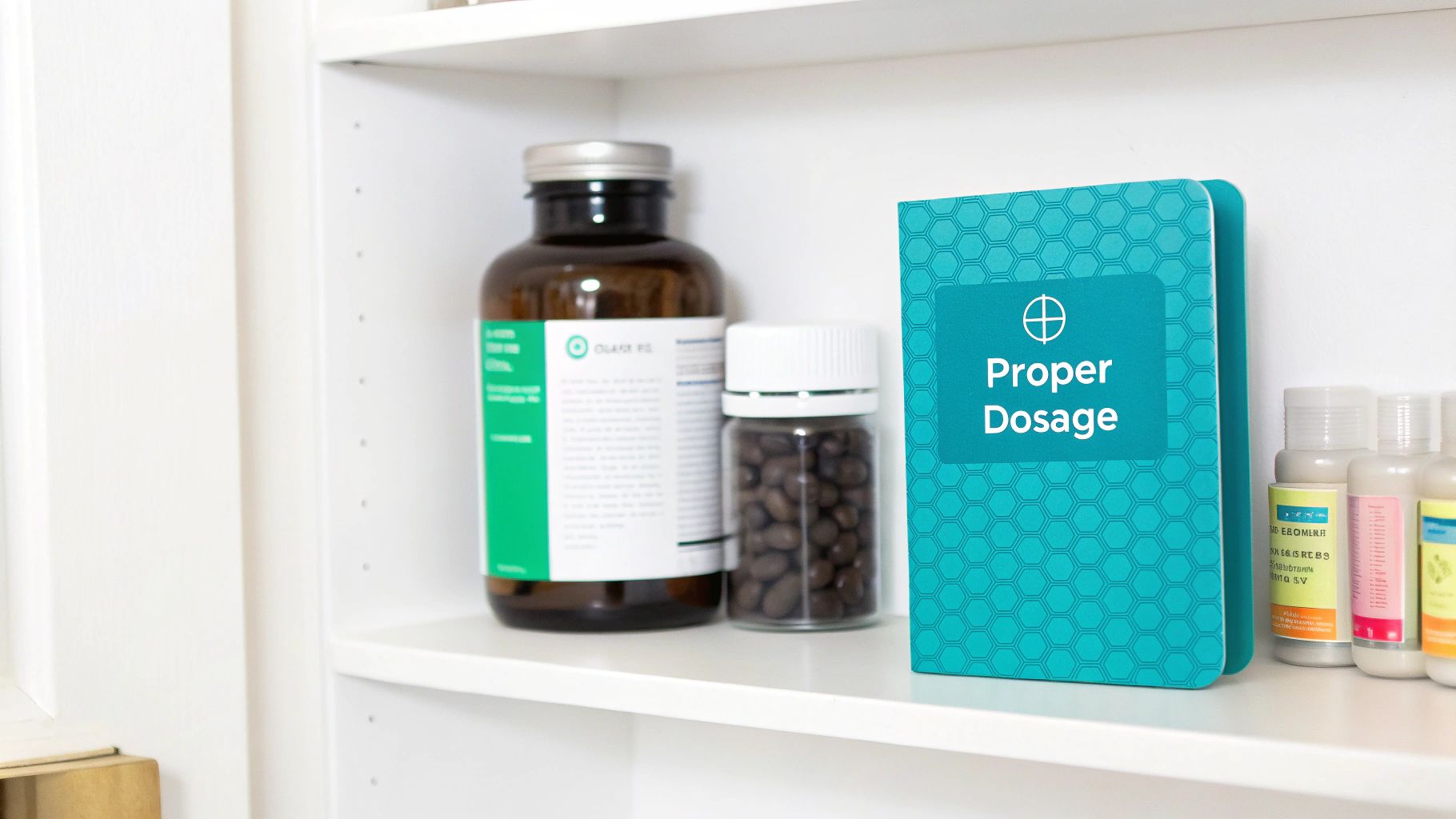
Since activated charcoal is useless for alcohol, reaching for it after a night out isn't just a waste of time—it can be genuinely risky. It’s often sold as a harmless “detox” supplement, but it's a powerful substance with significant side effects that demand respect.
Thinking of it as a benign cure-all is a dangerous mistake. The reality is that misusing activated charcoal can lead to a whole range of uncomfortable and sometimes serious health issues.
Common Side Effects and Risks
The most immediate problems you'll likely run into are gastrointestinal. Activated charcoal can really disrupt your digestive system, leading to some pretty unpleasant symptoms.
Common side effects include vomiting and constipation, as the charcoal can literally form a dense, unmoving mass in your gut. It can also cause black stools, which, while harmless, can definitely be alarming if you’re not expecting it.
Beyond the usual tummy troubles, there’s a rare but severe risk of aspiration. This happens if the fine powder is accidentally inhaled into the lungs, which can lead to serious respiratory complications like pneumonitis. Not fun.
The Biggest Danger: Medication Interference
Okay, here's the most significant hidden danger of using activated charcoal for alcohol or any other casual reason: it doesn't pick and choose what it grabs. That molecular sponge we talked about? It has no idea what’s a "toxin" and what’s your life-saving medication. It just adsorbs whatever it can.
This means if you take activated charcoal anywhere near the same time as your essential medications, it can render them completely useless. The charcoal can bind to the active ingredients, stopping your body from ever absorbing them and basically canceling them out.
This is a critical concern for anyone taking:
- Birth control pills
- Antidepressants
- Heart medications
- Blood pressure medicine
- Thyroid medication
By adsorbing your prescription medication, activated charcoal can lead to treatment failure or cause serious health complications. This is why it should never be used casually without talking to a doctor first.
This risk alone should shift your perspective on activated charcoal from a simple hangover helper to a substance with the potential for serious harm.
Instead of relying on an ineffective and risky method, it's so much better to focus on proactive strategies. If you're looking for smarter ways to handle a night out, check out our expert advice on how to prevent a hangover before drinking. Trust us, it's a much safer and more effective approach.
Safer and Smarter Ways to Handle Hangovers
So, we've established that activated charcoal for hangovers is pretty much a myth. What actually works when you wake up feeling like you’ve been hit by a truck? The real answer isn’t some trendy, quick-fix fad, but simple, science-backed support for your body’s own recovery systems.
Forget searching for a magic bullet. The smartest move you can make is to focus on giving your body back exactly what it lost during a night of drinking. Alcohol is a diuretic, which is just a fancy way of saying it makes you pee out a lot of fluids and essential electrolytes. This dehydration is enemy number one, and it's the main culprit behind your headache, fatigue, and dizziness.
The True Pillars of Hangover Recovery
Your absolute top priority should be rehydrating. That means drinking plenty of water to restore what you've lost. But here's the thing—water alone isn't always enough to get the job done right.
To truly bounce back, you also have to replenish electrolytes like potassium and sodium. These are mission-critical for your nerve and muscle function, and alcohol flushes them out.
The most effective hangover strategies don’t involve miracle cures; they involve actively restoring the hydration, nutrients, and rest that alcohol depletes from your body.
When you focus on these core needs, you're building a solid foundation to feel better, faster. For a deeper dive into the science, our guide has more science-backed tips on how to cure a hangover fast.
Practical Steps for a Better Morning
Let's skip the unproven shortcuts and get straight to the evidence-based strategies that help your body recover and reset. These simple actions directly tackle the physiological stress that alcohol puts you through.
Here are three reliable methods that genuinely help:
- Hydrate with Electrolytes: Sip on water all day, for sure. But also consider grabbing an electrolyte drink or even just eating a banana to get that potassium back in your system. This helps restore your body's balance much more effectively than plain water.
- Eat Nutrient-Rich Foods: Alcohol can mess with your blood sugar, often causing it to drop. A balanced meal with complex carbs, protein, and healthy fats will help stabilize it, giving you sustained energy and dialing down that classic hangover irritability.
- Prioritize Quality Rest: Your body does its best repair work while you're asleep. A hangover is basically a signal that your system is overworked, so giving yourself time to rest isn't lazy—it's a non-negotiable part of the recovery equation.
Ultimately, the best way to handle a hangover is to not get one in the first place. Drinking in moderation, staying hydrated while you're drinking, and never drinking on an empty stomach are always going to be the smartest and safest plays.
Got Questions About Charcoal and Alcohol? We’ve Got Answers.
Even after digging into the science, a few common questions about using activated charcoal for alcohol tend to pop up. Let's clear the air and give you some straight answers to the things we hear most often, so you have all the facts to make smart, safe choices.
Frequently Asked Questions
We've put together a quick FAQ table to tackle the most common questions head-on.
| Question | Answer |
|---|---|
| Can I take activated charcoal before drinking to prevent a hangover? | Nope. It's just as useless before drinking as it is after. The alcohol hits your bloodstream way too fast for the charcoal to ever catch up. It won’t stop you from getting drunk or prevent a hangover. |
| What if I took charcoal with my medication? | This is serious. Call your doctor or pharmacist right away. Charcoal is a magnet for all sorts of things and can absorb your medication, making it totally ineffective. This is not something to mess with. |
| Are those "charcoal detox" products for hangovers a total scam? | Pretty much. They're built on the idea that charcoal can mop up alcohol in your stomach, but the science just isn't there. No product with activated charcoal has ever been proven to help with hangovers. |
| So, what should I actually do for a hangover? | Focus on what your body really needs: rehydration with water and electrolytes, a good meal to balance your blood sugar, and plenty of rest. There's no magic pill—just good old-fashioned self-care. |
Hopefully, that clears things up! It's all about understanding what works and what's just marketing hype.
What if I Took Charcoal with My Medication?
This is a big one and deserves a closer look. If you've taken activated charcoal anywhere near the same time as your prescription or even over-the-counter meds, you need to get in touch with your doctor or pharmacist immediately.
Think of activated charcoal as indiscriminate—it can't tell the difference between a nasty toxin and the heart medication you need to stay healthy. It can easily adsorb things like antidepressants or birth control, basically stopping them from working. The health risks are very real, so this is a time to seek professional advice, no questions asked.
Key Takeaway: Never, ever mix activated charcoal with essential medications. Its job is to absorb things, and it will absorb the medicine your body needs, leading to some pretty serious problems.
What Should I Do for a Hangover Instead?
Okay, so we know activated charcoal for alcohol is a bust. What actually works? The best plan is to help your body do its own thing and recover naturally.
- Hydrate, Hydrate, Hydrate: Guzzle water. An electrolyte drink is even better to get back what the booze took out.
- Get Some Food In You: A balanced meal will help get your blood sugar back on track. Your body will thank you for the nutrients.
- Just Rest: Seriously. Sleep is probably the most powerful recovery tool you have. Give your body a break.
At the end of the day, the only real hangover "cure" is not getting one in the first place. Drinking in moderation, staying hydrated while you're out, and making sure you've got food in your stomach are your best bets for waking up feeling decent. True recovery comes from rehydration, good food, and sleep—not from a supplement that doesn't work.
Instead of relying on myths, choose a solution designed for modern life. Upside offers a science-backed, convenient jelly stick packed with natural ingredients to help you feel your best after a night out. Try Upside today and wake up refreshed.
